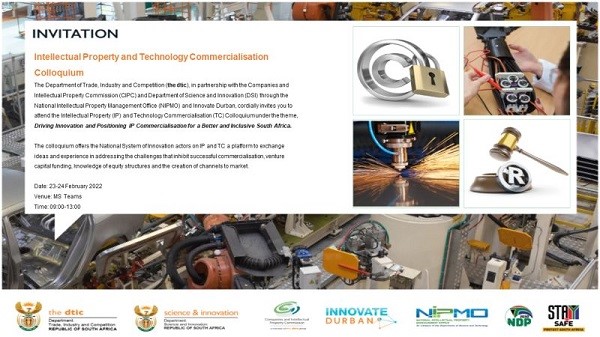Follow-up to the NIPMO Colloquium: Driving innovation and positioning Intellectual Property commercialisation for a better and inclusive South Africa at 23-24.02.2022
The Department of Trade, Industry and Competition of the Republic of South Africa (dtic), in partnership with the Department of Science and Innovation, through the National Intellectual Property Management Office (NIPMO), the Companies and Intellectual Property Commission (CIPC) and Innovate Durban, hosted the annual Intellectual Property and Technology Commercialisation Colloquium on 23rd and 24th February 2022.
The colloquium covered key areas of IP including development, protection, acquisition, exploitation and IP management. It presented the Technology Commercialisation process, relevant for early-stage and growth in companies, such as product-market fit, knowledge-for-equity structures, access to early-stage venture funding, establishing early customer relationships and creating channels to market. It was also discussed how the advancement of new technologies, and in particular the 4th Industrial Revolution (4IR), has an impact on the IP landscape and commercialisation of new technologies. Prof. Dr. Alexander J. Wurzer from the Center for International Intellectual Property Studies (CEIPI) presented there the best industry practice for digital based inventions.
He explained how the number of patent applications is positively evolving in the digital transformation, specifically for digital based inventions, which makes it necessary to introduce a system to deal with those inventions in a company. Recommendations for the introduction of an IP-Management system are given by the IP-management standards DIN 77006 and ISO 56005.
The DIN 77006 standard helps establishing a state of the art IP-Management System, which can be applied to introduce the necessary processes such as the digital invention disclosure process. Ensuring IP compliance through IP risk management is a must for digital inventions and the protection of digital solutions. The success of the IP management system depends on leadership, commitment and involvement of all levels and functions of the company. The IP management standard describes that processes must be identified and mapped. However, it does not prescribe exactly how this must be done in every company. The introduction of an IP management system according to DIN 77006 does not guarantee that the organization acts legally or that IP protection is improved – Only regular audits help to meet the challenges of IP compliance.
The ISO 56005 standard defines that IP-Management provides means for the organization to obtain and maintain a dynamic core capability and to transform its innovation results into valuable IP assets. However, there is no universal IP strategy to implement according to the standard. The IP strategy should be flexible to adapt and the goal of an IP Strategy is to create added value positions with the customer. How to achieve this goal was explained by Prof. Dr. Alexander Wurzer with example case studies of companies such as Shazam (US), SMA Solar Technology (US), and Tencent (CN) & Mirriad (GB).
The case studies come directly from the university education programs in IP-Management at CEIPI. The CEIPI offers various courses such as the Master of Intellectual Property Law and Management (MIPLM), the University Diploma in IP Business Administration (IPBA) as well as the various certificate courses. The presented topic is taught in the University Certificate Course on IP in the Industry 4.0.
The presentation of Prof. Dr. Wurzer can be seen here:



